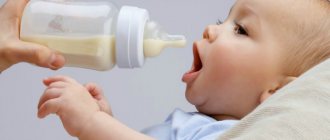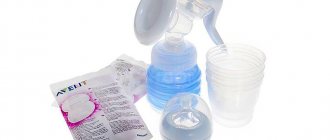Alcohol while breastfeeding: consequences
IMPORTANT: Systematic consumption of alcoholic beverages can cause disturbances in the functioning of hormones responsible for lactation.
For a breastfeeding woman, drinking alcohol can cause a reduction in milk production:
- Alcohol dehydrates the body, which negatively affects the amount of breast milk
- According to a 1988 study conducted on lactating female rats, an inhibitory effect of alcohol on the production of prolactin was found. Oxytocin, which is responsible for the milk ejection reflex, is also affected by alcohol intake. A 1992 study showed a significant reduction in milk output in response to a few grams of ethanol.
- slowing down the reaction. Caring for a child requires vigilance and maximum concentration. Alcohol can obviously deprive a woman of these qualities
The effect of alcohol on a baby while breastfeeding
If a woman abuses alcohol, the child may experience:
- underweight
- increased drowsiness
- impaired mental function
- sleep disorders
- delay in motor development
- addiction to alcohol
In 1989, a study was conducted in the United States on the effects of alcohol on the intellectual and physical development of one-year-old breastfed children.
Among 400 children who took part in the experiment, whose mothers drank alcoholic beverages in small quantities and whose mothers did not drink alcohol at all, no difference was found in infant development.
IMPORTANT: The opposite situation was observed in children regularly exposed to alcohol. Significant differences were noted in the motor development of these children.
In another study on the effects of alcohol exposure on lactating rat pups, cellular immunity and central nervous system deficits were noted in the pups in the long term.
Myths about alcohol while breastfeeding
1. There is an opinion that beer can increase lactation. Numerous studies by scientists and doctors have shown that this is not the case. On the contrary, even the lightest alcoholic drink significantly reduces breast milk production. This important fact should be remembered by every breastfeeding woman. Even when meeting with friends or receiving guests, you must refrain from drinking a glass of beer or wine. A decrease in the amount of milk will negatively affect the child’s health - he will not be full and will begin to lose weight.
2. You can drink alcohol in small quantities. This opinion will not be supported by any qualified and knowledgeable doctor or pediatrician. You should absolutely not drink alcohol in the first three months after the birth of your baby. Unfortunately, some women in rural areas still drink alcohol after childbirth. Ostensibly in order to relieve emotional stress after childbirth. Drinking alcohol after childbirth will not bring any relief to the mother. But there will be a risk of developing liver diseases in the baby.
3. Alcohol components accumulate in breast milk. This is also incorrect. After a certain time, alcohol is removed from the blood and breast milk. Under no circumstances should you express milk after drinking alcohol. A woman should simply bide her time and continue breastfeeding her baby after the harmful substances have been eliminated from the body.
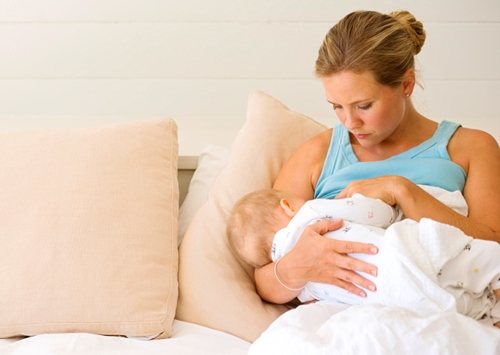
How much alcohol can you drink while breastfeeding?

The same amount of alcohol has a different effect on the state of intoxication of different people and on the rate of elimination of alcohol from their bodies. The following factors should be considered:
- child's age. The baby's liver is underdeveloped in the first weeks of life. The rate of alcohol elimination from the baby’s body is two times lower than that of his mother. Therefore, it is better to give up any amount of alcohol at least until the baby reaches three months of age.
- mother's weight. The lower the body weight, the longer the time interval for cleansing the body of ethanol
- food. The rate at which alcohol gets into milk depends on whether the alcohol was drunk on an empty stomach or during lunch.
IMPORTANT: Food, especially high-fat foods, makes it difficult for alcohol to penetrate the body.
Champagne while breastfeeding

Some nursing mothers allow themselves to take a sip of light champagne during the holidays, while others categorically refuse, citing the fact that it is harmful to the baby. So is it possible or not to drink champagne while breastfeeding?
- How dangerous is alcohol for a child?
- The harm of alcohol on the mother's body
- Champagne and lactation
- You can if you are careful enough
- Consequences of overuse
- Child's age and alcohol content
How dangerous is alcohol for a child?
Champagne contains alcohol, which is addictive.
When it enters the baby’s body, it is absorbed into the blood and causes negative reactions:
- drowsiness;
- excitement;
- changes in the functioning of the nervous system;
- mental disorders;
- developmental delay.
When parents drink regularly, the child becomes addicted. Ethyl alcohol acts on the body like a drug.
Therefore, doctors prohibit drinking alcohol-containing drinks while breastfeeding, even in minimal quantities.
If you care about your baby, you will listen to this opinion.
The harm of alcohol on the mother's body
Alcohol during feeding and not only harms the baby and mother. Alcohol is addictive.
If you drink alcohol regularly, you can become addicted. Then you will drink not for fun, but to satisfy your body’s need for alcohol.
This habit also leads to constant headaches and mental retardation.
Alcohol delays the mental process - thoughts are confused, speech becomes slow and incomprehensible, movements are clumsy and slow. In general, the human body does not listen.
Constant consumption of drinks containing alcohol leads to the following diseases.
- Personality degradation.
- Cirrhosis of the liver.
- Cardiovascular diseases.
- Epilepsy.
- Blood circulation in skin cells worsens.
- Drinking too much can cause a brain stroke.
- A fatal outcome is not excluded.
People often don't think about these consequences when they drink half a glass of wine or champagne at a banquet.
They think: “I’m not an alcoholic, I’ll drink a little and it won’t hurt.” But this is a mistaken opinion.
If a man can drink all his life and there will be no addiction, then women get used to alcohol much faster.
Gradually, the dose increases and, as a result, the former loving mother turns into an avid alcoholic, without noticing it.
For these reasons, it is better to avoid taking even small doses of alcohol. It's better to have fun in a sober mind.
Champagne and lactation
When alcohol enters the body, it is instantly absorbed into the blood cells and quickly spreads throughout the body.
After this, it dulls the production of the hormone oxytocin, which is responsible for lactation.
The presence of milk becomes difficult, and with systematic use it stops altogether.
The gases in champagne also delay milk production, which is why doctors prohibit drinking champagne and other carbonated drinks.
You can if you are careful enough
What to do if you are invited to a banquet where everyone drinks? In order not to be considered a “black sheep” and to feed your baby safely, you need to think about the consequences in advance.
Before leaving, feed your baby well and express the required amount for the next feeding.
During this time, the alcohol will be removed from the body and the next time the milk will not cause harm.
Useful tips for mothers: NUTRITION FOR A NURSING MOTHER
But you don’t need to lean heavily on champagne. Half a glass per evening will be enough to stay sane and lift your spirits.
When the child turns 6 months old, his health condition does not cause concern - he is alert, active and cheerful, then the doctor may allow the mother to drink a glass of champagne or red wine.
Several conditions must be met to minimize the effects of alcohol.
• You should not drink on an empty stomach; if you eat a large meal and then take a sip of wine, the alcohol will slowly penetrate the body and will not adversely affect the mother’s health.
• You should not drink large amounts of alcohol. This will cause alcohol intoxication and dullness of consciousness.
• You cannot feed your child after drinking alcohol for at least 3 hours.
Consequences of overuse
If a mother drank heavily during a party and returned home drunk, she becomes dangerous to her own child.
What does this mean?
• The mother will feed the baby milk that contains alcohol and other harmful substances.
• May fall asleep during feeding and crush the baby. When drunk, instincts become dull.
• May not hear when the child asks for food.
• Will not be able to perform child care duties such as feeding, changing a diaper or changing clothes.
For these reasons, mothers should think about whether alcohol is worth the life or health of her baby.
In most cases, mothers say “no” to alcohol and keep their baby healthy.
Child's age and alcohol content
Doctor Komarovsky warns that if a child is less than three months old, you should not drink alcohol or carbonated drinks at all.
This is due to the general weak condition of the baby.
At this age, the baby’s immunity has not yet been formed; even a small dose of alcohol will cause irreparable harm to the child.
From 3 to 6 months after consultation with a pediatrician, you can drink 20-30 grams of the drink. But following the rules of use described above.
At 6 months, the dose can be increased to 50 grams per day, but this does not mean that you can drink alcohol every day.
The main thing is to always remember: a sober person is always aware of his actions, and someone who drinks even a little alcohol can harm the baby.
- about the author
- Recent publications
Svetlana Ovechkina
author of the publication (site editor)
TEACHER Higher pedagogical education. Director of the kindergarten.
Svetlana Ovechkina recently published (see all)
- 7 month old baby’s daily routine – 03/28/2019
- Chocolate during breastfeeding - 03/25/2019
- How to resume breastfeeding - 03/21/2019
How to drink alcohol while breastfeeding?
Alcohol enters mother's milk and a woman's circulatory system in almost equal volumes (about 2% of the alcoholic beverage consumed). The ethanol concentration in milk reaches its maximum value after approximately ½-1 hour. The duration varies depending on the woman's weight, her metabolism, the percentage of fat in the food she eats and other factors.
IMPORTANT: Alcohol does not tend to accumulate in milk. Alcohol is removed from it at the same time it leaves the body’s circulatory system.
In other words, neither pumping milk nor drinking strong coffee or showering will speed up the process of clearing alcohol from your milk.

A few recommendations:
- If you intend to relax at an upcoming party with the help of alcohol, form a “expressed milk bank” in advance.
- If you have a glass of champagne or wine with dinner, wait at least two to three hours before your next breastfeeding.
- You should express milk if there is a need to relieve tension in the chest. This will not help remove alcohol from mother's milk.
- Alternatively, at a wedding or other festive event you can get by with non-alcoholic cocktails, the choice of which is now quite varied
Is it possible to drink beer while breastfeeding?
The point of view that beer can increase milk production is not supported by scientific facts. Studies show that after the mother drinks an alcoholic drink, the child demands the breast more often and eats longer.
It may seem to a woman that there is more milk, but in reality, the baby eats 20% less. Whether this is due to a deterioration in the smell of milk or to the suppression of the lactation reflex is not known for certain.
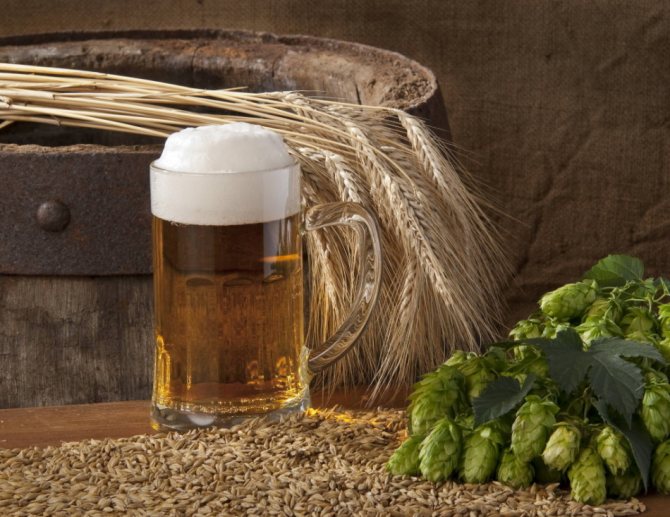
IMPORTANT: When preparing beer, natural ingredients are involved: hops and barley, which are not allergens.
Moreover, beer contains valuable B vitamins. Therefore, allowing yourself a small amount of beer from time to time is quite acceptable. However, when choosing beer, you should give preference to light varieties and bottled beer without preservatives.
Alcohol during breastfeeding - Komarovsky on the effect of alcohol on the child’s body
The birth of a baby is a considerable responsibility to all parents, and especially to his mother, since it is her lifestyle that will determine the fate and health of the child in the future.
As a rule, during pregnancy, expectant mothers adhere to all dietary rules.
However, during the period of breastfeeding, and especially when it drags on, some new parents begin to allow themselves such weaknesses as a glass of wine.
Komarovsky and many other pediatricians do not consider drinking low-strength alcohol while breastfeeding to be strictly prohibited. Today, the issue of the influence of weak alcohol remains quite controversial.
And even despite the fact that domestic doctors strongly do not recommend consuming it for mothers who give milk, it is generally accepted that a glass of red wine or a low-alcohol cocktail does not have any risks regarding the baby’s health.
In order to understand this issue, it is necessary to understand how alcohol enters milk and subsequently harms the baby’s health.
How does alcohol pass into breast milk?
Alcohol and breastfeeding are not the best combination. It should be noted that in the body of nursing mothers, wine is absorbed faster, and, on the contrary, is excreted more slowly. Within half an hour, ethanol molecules contained in wine enter the bloodstream, and this happens much faster with sparkling wine - only 10 minutes.
Alcohol enters a nursing mother's milk through the blood. Accordingly, it does not matter how often pumping is done. It should be noted that several hours after the feast, the maximum concentration of alcohol in mother's milk is observed.
Elimination of alcohol from mother's milk
The following factors directly determine the concentration of alcohol in the blood, respectively, in mother’s milk:
- Mother's weight. The process of removing alcohol from the mother's blood and milk directly depends on the woman's weight.
- Volume of strong drinks consumed. It is logical to assume that the less you drink, the faster everything excess will be eliminated from the body.
- Availability of snacks. You should not drink strong drinks on an empty stomach.
What does Komarovsky think about drinking alcohol while breastfeeding?
Pediatric doctor Komarovsky says that alcohol during breastfeeding has different effects on the child. So, the pediatrician believes, a nursing woman can drink very little beer. And if you consume high-quality drinks in minimal quantities, you can get some benefits in the form of vitamins contained in barley malt and brewer's yeast.
Naturally, in addition to vitamins, foamy drinks contain various preservatives, which, in turn, will not bring any positive results to the body of the young mother or her child. However, if a young woman still cannot resist the temptation to drink a glass of beer, Komarovsky advises choosing a drink in a glass bottle.
And although the pediatrician is against categorical prohibitions on alcohol consumption, he is deeply convinced that strong alcoholic drinks such as vodka, whiskey or cognac can have irreversible consequences on the child’s health. Check out the video where Evgeny Komarovsky shares valuable information on breastfeeding, and also answers frequently asked questions from his “school” students.
What are the dangers of drinking alcohol for a baby?
It all depends on how often mom drinks a glass of the “forbidden” drink. In a baby whose mother rarely allows herself such weaknesses, doctors identify signs such as fatigue and drowsiness. However, more negative consequences can occur in children whose mothers often get involved in drinking. Let's consider the results of the harmful effects of strong drinks during breastfeeding.
- The baby becomes overly excitable. This is explained by the fact that alcoholic drinks have an adverse effect on the child’s central nervous system. As a result, the baby becomes unbalanced, his sleep is disturbed, and in some cases the child becomes lethargic and loses his energy.
- When a parent abuses alcoholic beverages, the baby is diagnosed with a rapid heartbeat and shortness of breath. This leads to serious consequences.
- It is also worth noting how negatively alcohol affects the functioning of the digestive tract. Namely, it aggravates attacks of colic, which, in turn, is explained by the immaturity of the microflora in babies. Moreover, there is a risk of delayed development of children in psychophysical terms.
- Another vulnerable children's organ that suffers from intoxication is the liver. The liver of a newborn baby cannot itself fight the effects of ethanol contained in alcohol. And even a small dose can lead to malfunction of this organ.
- And the worst consequence is the risk of the child developing alcohol dependence. Due to the irresponsible attitude of the parent, he may develop an addiction, because the harmful effect of alcohol on a child’s fragile body is much stronger than on an adult.
The consequences listed above may become more pronounced if alcohol is abused.
Drinking alcohol while breastfeeding: tips and reviews
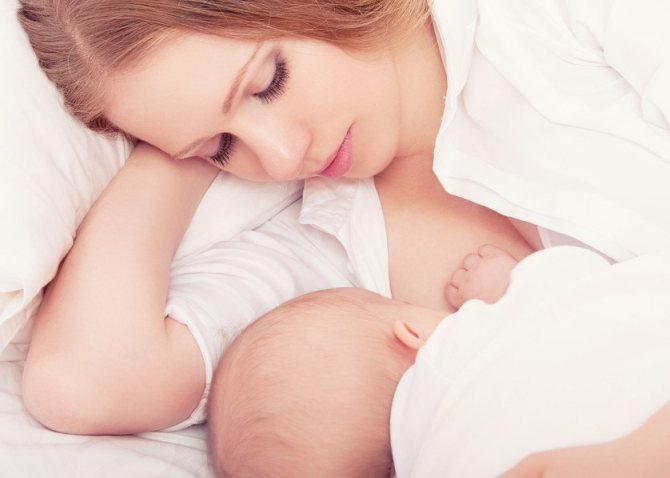
- Dr. Jack Newman from the international organization La Leche League believes that breastfeeding mothers should not be discouraged from sensibly drinking alcohol, due to the fact that alcohol, like some drugs, passes into milk in an insignificant amount
- A similar point of view about alcohol during breastfeeding is shared by pediatrician E. Komarovsky , who opposes categorical prohibitions
- Dr. Thomas Hale , recommends that mothers who drink alcohol in moderation breastfeed as soon as they feel normal again, citing that the average woman metabolizes 30 ml of alcohol in three hours
Harm of alcohol while breastfeeding
The dangers of alcohol can be stated only in cases of regular consumption of alcohol in significant quantities. Refusal to breastfeed would be a greater loss for the infant than the existing risk from occasional consumption of alcoholic beverages.
But a nursing woman must make a decision for herself: whether she should experiment with alcohol-containing drinks during lactation. To be sure, it is better to prepare expressed milk in advance and resume breastfeeding after ethanol has been completely removed from the female body.



